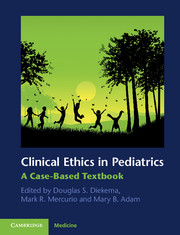Book contents
- Frontmatter
- Contents
- Contributors
- Preface
- Section 1 Core issues in clinical pediatric ethics
- Section 2 Ethical issues at the beginning of life: perinatology and neonatology
- Section 3 When a child dies: ethical issues at the end of life
- Section 4 Ethical issues posed by advances in medical technology and science
- 25 Minors as recipients and donors in solid organ transplantation
- 26 Enhancement technologies and children
- 27 Cochlear implants and deaf children
- 28 Ethical issues in the treatment of pediatric patients with disorders of sex development
- 29 Sterilizing procedures in minors with cognitive disabilities
- 30 Parental requests for intervention in children with lethal conditions
- 31 Genetic testing and screening of minors
- 32 The introduction of innovative technology into practice
- 33 Human subjects research involving children
- Section 5 Children, public health, and justice
- Section 6 Special topics in pediatric ethics
- Index
- References
33 - Human subjects research involving children
from Section 4 - Ethical issues posed by advances in medical technology and science
Published online by Cambridge University Press: 07 October 2011
- Frontmatter
- Contents
- Contributors
- Preface
- Section 1 Core issues in clinical pediatric ethics
- Section 2 Ethical issues at the beginning of life: perinatology and neonatology
- Section 3 When a child dies: ethical issues at the end of life
- Section 4 Ethical issues posed by advances in medical technology and science
- 25 Minors as recipients and donors in solid organ transplantation
- 26 Enhancement technologies and children
- 27 Cochlear implants and deaf children
- 28 Ethical issues in the treatment of pediatric patients with disorders of sex development
- 29 Sterilizing procedures in minors with cognitive disabilities
- 30 Parental requests for intervention in children with lethal conditions
- 31 Genetic testing and screening of minors
- 32 The introduction of innovative technology into practice
- 33 Human subjects research involving children
- Section 5 Children, public health, and justice
- Section 6 Special topics in pediatric ethics
- Index
- References
Summary
If we knew what it was we were doing, it would not be called research, would it? (Albert Einstein)
Introduction
Pediatric research presents a number of different ethical challenges when compared with the clinical practice of pediatrics. Clinical practice is focused on caring for the individual patient using proven methods of diagnosis and treatment, while research embarks on the journey to find new treatments for future patients. This core difference in purpose is the ethical foundation for distinguishing between research and clinical practice (Litton & Miller, 2010). Most of the literature in research ethics uses a particular clinical trial or research dilemma as a starting point. We have opted to present a case study that arises in the clinical context to help highlight the distinctions between what is clinical practice and what is research. We contend that clinical practice and research should be treated differently from an ethics perspective, particularly when the questions involve children.
Case narrative
Colin, a 16-year-old boy, presents at the local emergency room with vomiting, high fever, and possible internal bleeding. Colin has a complex medical history and is well known to the hospital service. He was born in a difficult quintuplet birth and suffered a perinatal anoxic event, which has left him severely developmentally delayed. Colin smiles and makes eye contact and he communicates through simple language and gestures. Physicians estimate his level of understanding and cognitive abilities to be at the level of a 10-year-old. Physicians project that Colin could continue to benefit from participation in a vigorous program of therapy and rehabilitation, though progress would be slow.
- Type
- Chapter
- Information
- Clinical Ethics in PediatricsA Case-Based Textbook, pp. 194 - 198Publisher: Cambridge University PressPrint publication year: 2011
References
- 1
- Cited by

